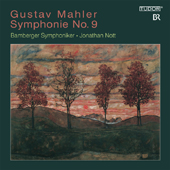
ESSENTIAL RECORDINGS

Master Mahlerians on the Flank: The Bambergers might seem like another middle-weight Central European Orchestra with an imported conductor. But in the half-dozen years that they have been recording under Jonathan Nott for the Zurich-based Tudor label, the orchestra has emerged as a force to be reckoned with. Emblematic of the partnershipís ascendency was the award for the yearís best new recording of a Mahler work at the 2009 Toblach-Dobbiaco festival. That this event was simultaneous with the albumís release in Europe last August is indicative of its superb quality and powerful impact. It is the fourth issue in a complete Mahler symphony cycle which is due to conclude in 2011, the centennial of the composerís death.
Nott in Vain: Thus far, Nott has produced a decent version of the Fifth, an outstanding account of the First and a very good Fourth (which might have made a stronger impression if it had not appeared at the same time as the Channel Classics recording by IvŠn Fischer and the Budapest Festival Orchestra). There is every reason to expect that Nott will produce a strong and competitive cycle and this is reinforced by the glorious depth of his interpretation of the Ninth. It is a performance which keeps within the boundaries of mainline Mahler while presenting the symphonyís contrasts of light and shadow more vividly than we are accustomed to hearing. The orchestra responds to the conductor with a devotion faithfully captured in breathtaking sound quality. In super-audio multichannel or stereo and conventional CD playback, this issue can lay claim to the distinction of best-recorded Mahler Ninth, ever.
A Gilbertian Solution: Again, Nott and his valiant orchestra had the bad luck to collide with another excellent recording of the same work. The competition came from Alan Gilbert and the Stockholm Philharmonic for BIS (also a Hybrid SACD). Gilbertís interpretation was widely praised but the British writer and Mahler know-it-all, Norman Lebrecht, hated it (a sharp hint that the rest of us must pay attention). Surveying a collection of thirty-odd Mahler Ninths, Gilbertís was found to resemble only one other. Bruno Maderna with the BBC SO in 1971 (BBC Music) is close to Alan Gilbert in terms of rambunctious hyper-creativity. Gilbert is electrifying. Soothing interludes in the first three movements are few and far between. He aims for a sublime finale and achieves this for listeners already severely shaken and stirred.
The Verdict: Alan Gilbertís performance is exciting and it deserves to be heard but this could be characterized as Ďdawn to duskí Mahler. For the dark night of the soul, Jonathan Nott is a more sympathetic guide. If it is not possible to acquire both, the Nott album is recommended as the version for all seasons, all times and every shade of anguish. It is a recording which can be filed alongside Karajanís 1982 live BPO performance (DG) and Riccardo Chaillyís with the Concertgebouw (Decca).
Stephen Habington